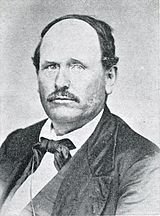Andrew J. Thayer facts for kids
Quick facts for kids
Andrew Jackson Thayer
|
|
|---|---|
 |
|
| Member of the U.S. House of Representatives from Oregon's At-large district |
|
| In office March 4, 1861 – July 30, 1861 |
|
| Preceded by | Lansing Stout |
| Succeeded by | George K. Shiel |
| 21st Associate Justice of the Oregon Supreme Court | |
| In office 1870–1873 |
|
| Preceded by | John Kelsay |
| Succeeded by | Lafayette F. Moser |
| Personal details | |
| Born | November 27, 1818 Lima, New York |
| Died | April 28, 1873 (aged 54) Corvallis, Oregon |
| Political party | Democratic |
| Spouse | Melissa D. Chandler |
Andrew Jackson Thayer (born November 27, 1818 – died April 28, 1873) was an important lawyer and politician from Oregon. He was a member of the Democratic Party. He even served as a U.S. congressman for a short time.
Before becoming a congressman, Thayer worked as the U.S. Attorney for Oregon. This job meant he was the main lawyer for the United States government in Oregon. His brother, William W. Thayer, later became the governor of Oregon. After his time in Congress, Andrew Thayer continued his legal career. He worked as a district attorney and later as a judge on the Oregon Supreme Court.
Contents
Early Life and Law Career
Andrew Jackson Thayer was born in Lima, New York. He went to public schools there. After school, he started his own law practice in Lima with his brother.
In March 1853, Thayer decided to move west to Oregon. He traveled by ox team along the famous Oregon Trail. He arrived in Salem in August 1853. He then settled on a farm near Corvallis. There, he farmed and continued his work as a lawyer.
In 1859, President James Buchanan chose Thayer to be the U.S. Attorney for the District of Oregon. He held this important position for six months. However, he resigned because he preferred defending people in court rather than prosecuting them.
The Contested Election of 1860
In November 1860, Andrew Thayer was elected as a Democratic U.S. Representative for Oregon. This meant he was chosen to represent Oregon in the U.S. Congress.
However, there was a big problem. Another election for the same congressional seat had already happened in June 1860. In that earlier election, George K. Shiel was chosen.
Why Two Elections?
After the June election, the Oregon House of Representatives tried to change the date for U.S. Congress elections to November. The Oregon Senate also tried to pass a similar law. But these laws were never fully agreed upon or signed. Even so, an election was held in November, and Thayer won. His election was confirmed, and he took his seat in Congress in March 1861.
The Challenge in Congress
George K. Shiel quickly challenged Thayer's election. Shiel argued that the Oregon constitution had been ignored. He said no proper law was passed to change the election date.
Thayer argued that the state constitution's rule about election dates only applied to Oregon's very first congressional election in 1858. He believed the June 1860 election was not valid. Thayer pointed out that the Oregon Legislature clearly wanted a November election. Since that election happened and he won, he felt he should keep his seat.
The House Decision
On July 30, 1861, the United States House Committee on Elections looked into the matter. This committee, led by Henry L. Dawes, decided in favor of Shiel. They said that the state constitution's June election date was meant for all elections. They also said that even if Oregon had passed a law to change the date, it would have been against the constitution. Since no law was actually passed, Shiel's election was valid, and Thayer should lose his seat.
Representative Thaddeus Stevens disagreed. He thought this decision went against the U.S. Constitution. The Constitution says that state legislatures have the power to set election dates. Stevens suggested that the seat should just be left empty, but his idea was voted down. The House then removed Thayer from his seat and gave the oath of office to Shiel right away.
After Congress and Later Life
After leaving Congress, Andrew Thayer went back to his law practice in Oregon. His brother, William W. Thayer, who later became governor, joined him there.
Andrew Thayer continued to serve the public. From 1862 to 1864, he was the district attorney for Oregon's second district. In 1870, he was elected to the Oregon Supreme Court. This meant he became a judge on the highest court in Oregon. He also traveled around Oregon's second judicial district to hear cases. He did not finish his six-year term as a judge because he passed away while still in office.
Death
Andrew Jackson Thayer died in Corvallis on April 28, 1873. He is buried in the Crystal Lake Masonic Cemetery in Corvallis.
 | Kyle Baker |
 | Joseph Yoakum |
 | Laura Wheeler Waring |
 | Henry Ossawa Tanner |

